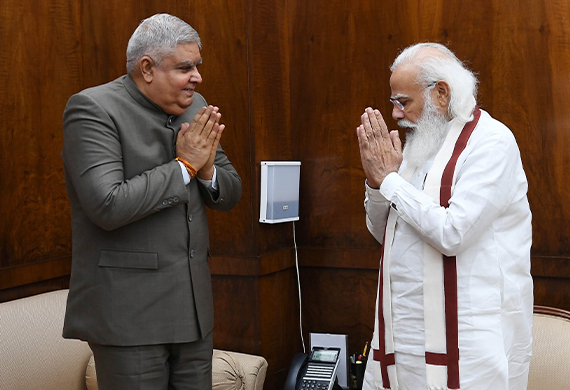
In a First, RS Panel Consists of 13 Women Vice-Chairpersons for Women's Bill Discussion
By: WE Staff | Thursday, 21 September 2023
Vice-President and Rajya Sabha Chairman Jagdeep Dhankhar has taken a momentous step towards acknowledging the pivotal role of women in Indian politics. On Thursday, he reconstituted a panel comprising 13 accomplished women members of the Rajya Sabha, appointing them as vice-chairpersons for the day. This exceptional move aligns with the ongoing discussions in the Rajya Sabha concerning the Nari Shakti Vandan Adhiniyam Bill, 2023.
Chairman Dhankhar emphasized the profound symbolism of having women MPs take on leadership roles during these deliberations. It is not merely a procedural formality but a powerful message to the world, signifying the commanding position that women hold in shaping the future during this epochal moment of change.
The panel of vice-chairpersons, handpicked for their remarkable contributions and dedication, includes celebrated figures such as the legendary athlete P T Usha, renowned actress Jaya Bachchan, and proficient politicians like Saroj Pandey, among others. Their presence at the helm of these discussions serves as a testament to the diverse talents and capabilities of women in the political landscape.
The nature of these discussions revolves around the Nari Shakti Vandan Adhiniyam Bill, 2023, more commonly known as the Women's Reservation Bill. The significance of this Bill cannot be overstated. It stands as a landmark legislative initiative aimed at ensuring equal representation of women in the lower house of the Indian Parliament. The Lok Sabha had already passed this historic Bill the day prior, marking a watershed moment in Indian politics.
What sets this achievement apart is not just the substance of the Bill but also the historical context. Various governments have attempted to introduce similar legislation since 1996, but consensus remained elusive. This time, however, the tide of change has swept in, finally realizing the aspiration of equal representation for women.
Adding another layer of significance is the fact that this Women's Reservation Bill is the very first piece of legislation to be tabled in the newly constructed parliament building, making it a momentous occasion in the annals of Indian parliamentary history.
This move signifies a profound shift in the dynamics of Indian politics, where women are increasingly being recognized and empowered to play a central role in shaping the nation's destiny. It underscores the importance of not only passing laws but also ensuring their effective implementation to bring about real change in society.
In a country as diverse and dynamic as India, equal representation in political decision-making is a crucial step towards a more equitable and inclusive future. The presence of women in leadership positions not only reflects the diversity of the nation but also brings forth a wider spectrum of perspectives and priorities.
As the discussions on the Women's Reservation Bill continue in the Rajya Sabha, the presence of these 13 accomplished women parliamentarians in leadership roles serves as a beacon of hope, inspiring a new generation of women to actively participate in the political discourse and contribute towards building a more inclusive and representative democracy.
Most Viewed
- 1 Women's Health Startup HerMD Closing Doors Amid Industry Challenges
- 2 5 Famous Women in Indian Armed Forces
- 3 Saudi Women No longer Require Male Permission for Clothing Choices, says Prince MbS
- 4 Kolkata Medtech Startup Innovodigm Raises Rs 5.5 Crore Seed Funding Led by IAN Group
- 5 Yamunanagar's Kashish Kalra Honoured after Securing 111th Rank in UPSC Civil Services Exam
- 6 Madurai Appoints Its First Woman Corporation Head
- 7 IAS Vijayalakshmi Bidari Appointed as the new Nagpur Divisional Commissioner
- 8 American Entrepreneur Lucy Guo Overtakes T Swift to become Youngest Female Billionaire
- 9 ICC Women's World Cup 2025 Trophy Showcased at Indore's Holkar Stadium
- 10 Aparna Saxena's Beauty Venture AntiNorm Launches in India
- 11 Vidya Nataraj Co-Founded BlueStone Jewellery & Lifestyle files IPO
- 12 5 Women Freedom Fighters of India
- 13 Dr. G Krishnapriya appointed as CEO for Trichy
- 14 M3M & Sirona Partner to Introduce Menstrual Hygiene Vending Machines in 15 Locations
- 15 Punjab Govt launches SHE Cohort 3.0 Supporting Tech-led Women Startups
- 16 Indian origin Lawyer, Sweena Pannu appointed as the US New Superior Court Judge
- 17 The Aurora Tech Award recognizes 4 Indian Women-led Startups
- 18 Kerala's Republic Day parade featured an all-female tableau
- 19 Manisha Kabbur Becomes Karnataka's First Woman International Karate Coach
- 20 Director K. S. Ravikumar's Daughter Maalica Ravikumar Launches Life Coaching Company 'Evergrowth Academy' for Women
- 21 Leezu's Raises Pre-Seed Funding to Accelerate Growth in Sexual Wellness Industry
- 22 Sattu: Super-easy summer drink for PCOS gut healing
- 23 Swathi Nelabhatla creates Sitha App, India's First Women-Exclusive Gig Platform
- 24 7 Timeless Female Kathak Dancers & their Iconic Legacies
- 25 Meet 7 Iconic Women Architects of Modern India & their Most Impactful Work
- 26 This Woman-led Insuretech Startup is Helping Bridge the Education Financing Gap in India
- 27 Women Leaders Share Lessons Learnt from India Women's WC Win
- 28 5 Enterprising Women Founders Powering Singapore's Tech & Innovation Landscape
- 29 4 Women. 4 Stories. One Vision for Smarter, Stronger Healthcare
- 30 Global Gender Gap Narrows to 68.8%, But Full Equality 123 Years Away: WEF Report 2025
- 31 Changemakers: 7 Women Entrepreneurs Taking the Make in India Movement Forward
- 32 Meet Lucy Guo, The Youngest Self-Made Female Billionaire Disrupting Tech
- 33 How Women are Driving India's Festive Online Shopping Surge






